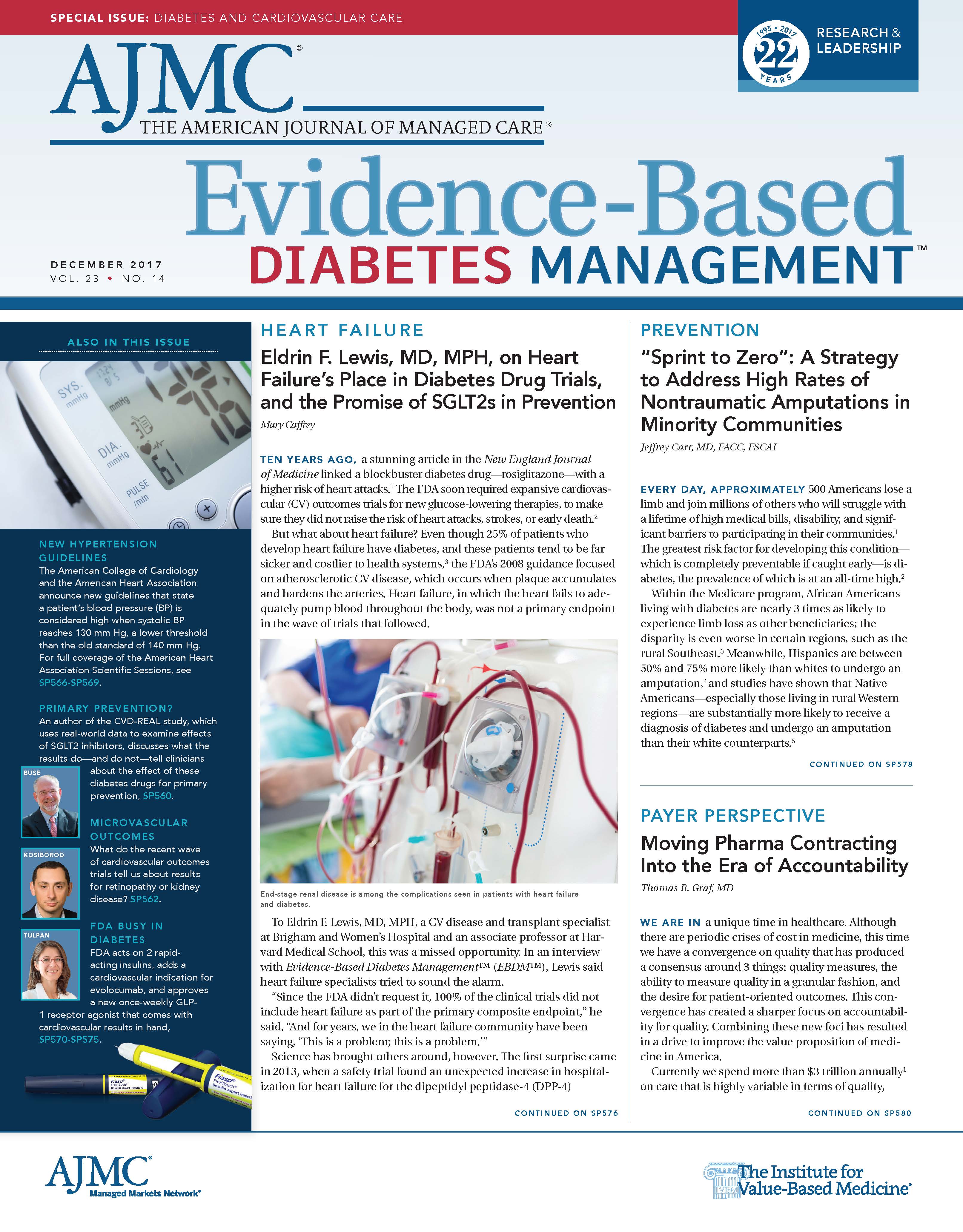- Center on Health Equity & Access
- Clinical
- Health Care Cost
- Health Care Delivery
- Insurance
- Policy
- Technology
- Value-Based Care
For Those With Diabetes and CV Risk, Personalized Care Matters
From the Editor in Chief
IN 1979, THE FRAMINGHAM STUDY told us that people with diabetes are at least twice as likely to develop cardiovascular disease (CVD), putting them at risk for early death from cardiovascular (CV) causes. Since that time, those of us in diabetes care have searched for the right combination of lifestyle management, therapy, and other tools to change this fact. We’ve made progress, but it remains true that people with diabetes die of heart disease at much higher rates than others, and we don’t entirely understand why.
Although we know many of the risk factors that are responsible for diabetes being a cardiovascular risk equivalent, the traditional risk factors (hypertension, hyperlipidemia, and obesity) do not fully explain why the risk of a myocardial infarction (MI) in a patient with diabetes is roughly the same as a typical post-MI patient without diabetes. Precision medicine should be able to identify new risk factors and predictors of coronary disease—the leading cause of mortality for people with diabetes. We must account not only for genetic and environmental factors but also for behavioral and socioeconomic diferences, which can predict how well a patient will be able to follow a regimen for the long haul.
We continue to learn. Data gathered a decade ago during Action to Control Cardiovascular Risk in Diabetes (ACCORD) are providing new insights and resolving a puzzle: why did patients at high risk of CVD who had extremely tight glycemic control have a higher rate of fatal heart attacks? Why did they fare worse than their counterparts in standard care? Are there new risk factors that might explain this surprising diference? In other words, those in the group with the most tightly controlled diabetes were less likely to have a heart attack, but if they had one, it was more likely to be fatal.
Last month, scientists led by Joslin Diabetes Center published a paper in Diabetes Care that that fnds genetic links between glucagon-like peptide-1 (GLP-1) and CV mortality. The team showed how patients in the ACCORD study with a genetic variant associated with CV mortality saw their fasting GLP-1 levels drop while undergoing strict glycemic control. For those without the variant, GLP-1 levels were stable.
The implications of this fnding are potentially signifcant. We already know that GLP-1 agonists can reduce cardiovascular events in people with diabetes. Several GLP-1 receptor agonists have been approved based on their ability to promote insulin production, and 2 have already shown CV benefts in clinical trials. One (liraglutide) received FDA approval in August for a cardiovascular indication with the recently approved semaglutide likely to follow. Furthermore, the genetic variant found in the ACCORD population may repre sent a new risk factor in explaining the high risk of CVD in individuals with diabetes.
Along with GLP-1 agonists, a second glucose lowering medication, has been shown to decrease cardiovascular events: SGLT2 inhibitors. As we review the fndings of the cardiovascular outcomes trials for 2 of the approved sodium glucose co-transporter-2 (SGLT2) inhibitors, there the belief is that they cause diuresis and volume contraction to produce benefts for patients with congestive heart failure, leading to fewer hospitalizations.
Both examples are of interest to payers, who are interested in getting the right drugs to the right patients, and who want proof that therapies can reduce costs in high-risk populations. The surprising results with SGLT2 inhibitors have sparked a new round of trials to resolve the unanswered questions about their role in heart failure, in patients with and without diabetes.
For all the promise of new therapies, however, the basics of care coordination and meeting patients where they are cannot be overlooked. For patients who live with diabetes and heart disease day after day, the financial cost and personal toll are considerable. At Joslin, sharing these lessons along with the latest science is essential to what we do every day.About the Author
Dr Gabbay is senior vice president and chief medical officer, Joslin Diabetes Center. He is editor in chief of Evidence-Based Diabetes ManagementTM.

Building Trust: Public Priorities for Health Care AI Labeling
January 27th 2026A Michigan-based deliberative study found strong public support for patient-informed artificial intelligence (AI) labeling in health care, emphasizing transparency, privacy, equity, and safety to build trust.
Read More
What It Takes to Improve Guideline-Based Heart Failure Care With Ty J. Gluckman, MD
August 5th 2025Explore innovative strategies to enhance heart failure treatment through guideline-directed medical therapy, remote monitoring, and artificial intelligence–driven solutions for better patient outcomes.
Listen
Motivating and Enabling Factors Supporting Targeted Improvements to Hospital-SNF Transitions
January 26th 2026Skilled nursing facilities (SNFs) with a high volume of referred patients with Alzheimer disease and related dementias may work harder to manage care transitions with less availability of resources that enable high-quality handoffs.
Read More

